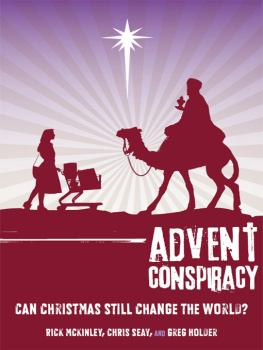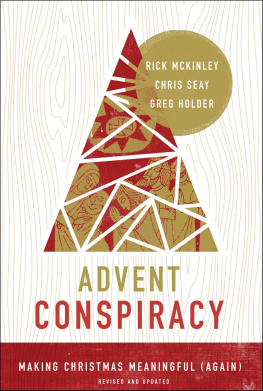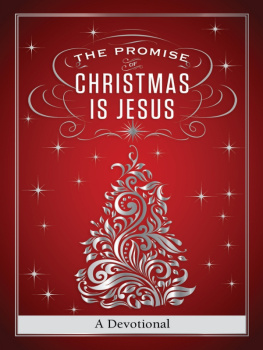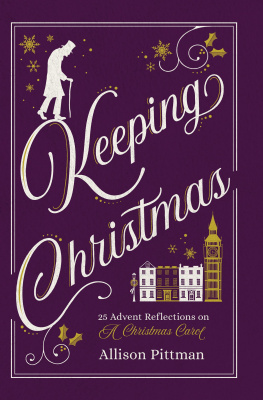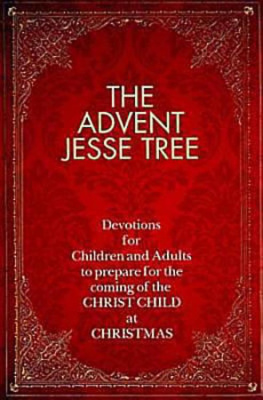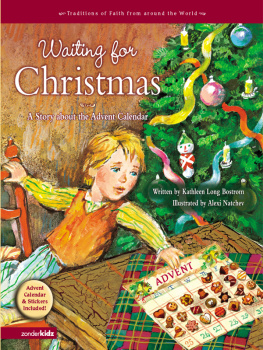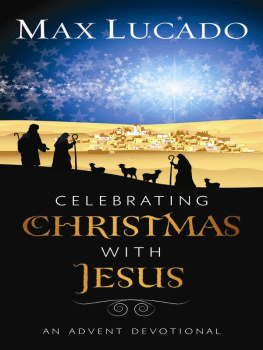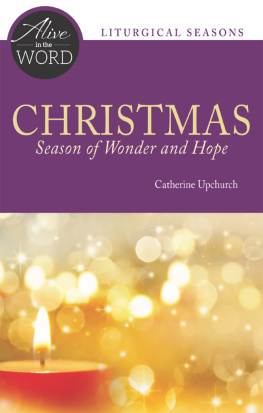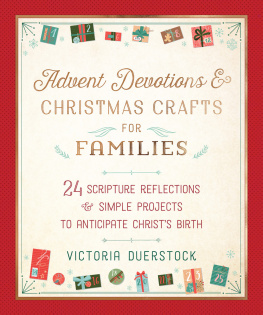
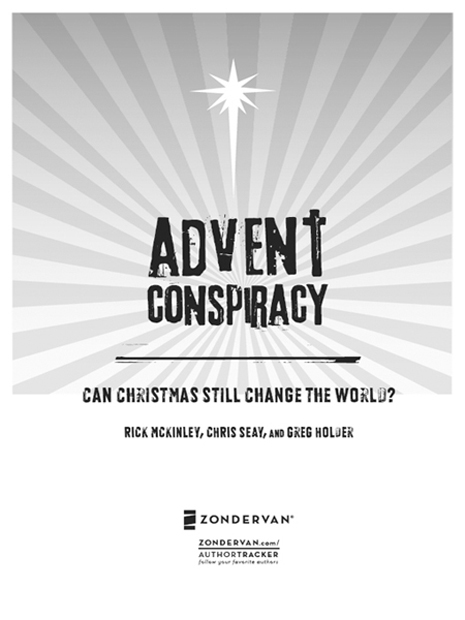
ZONDERVAN
Advent Conspiracy
Copyright 2009 by Rick McKinley, Chris Seay, and Greg Holder
This title is also available as a Zondervan ebook.
Visit www.zondervan.com/ebooks.
All rights reserved under International and Pan-American Copyright Conventions. By payment of the required fees, you have been granted the non-exclusive, non-transferable right to access and read the text of this e-book on-screen. No part of this text may be reproduced, transmitted, down-loaded, decompiled, reverse engineered, or stored in or introduced into any information storage and retrieval system, in any form or by any means, whether electronic or mechanical, now known or hereinafter invented, without the express written permission of Zondervan.
ePub Edition August 2009 ISBN: 978-0-310-53916-2
Requests for information should be addressed to:
Zondervan, Grand Rapids, Michigan 49530
Library of Congress Cataloging-in-Publication Data
McKinley, Rick.
Advent conspiracy : can Christmas still change the world? /
Rick McKinley, Chris Seay, and Greg Holder ; with contributions from
co-conspirators around the world.
p. cm.
Includes bibliographical references.
ISBN 978-0-310-32452-2 (softcover)
1. Christmas. 2. Consumption (Economics) Religious aspects
Christianity. I. Seay, Chris. II. Holder, Greg, 1961 III. Title.
BV45.M43 2009
263'.915 dc22 2009023110
All Scripture quotations, unless otherwise noted, are taken from the The Voice New TM Testament. Copyright 2008, Thomas Nelson, Inc. Copyright 2006, 2007, 2008 Ecclesia Bible Society. All rights reserved.
Scripture quotations marked NIV are taken from the Holy Bible, New International Version. NIV. Copyright 1973, 1978, 1984 by International Bible Society. Used by permission of Zondervan. All rights reserved.
Any Internet addresses (websites, blogs, etc.) and telephone numbers printed in this book are offered as a resource. They are not intended in any way to be or imply an endorsement by Zondervan, nor does Zondervan vouch for the content of these sites and numbers for the life of this book.
All rights reserved. No part of this publication may be reproduced, stored in a retrieval system, or transmitted in any form or by any means electronic, mechanical, photocopy, recording, or any other except for brief quotations in printed reviews, without the prior permission of the publisher.
Published in association with Yates & Yates, www.yates2.com.
Interior design by Beth Shagene
CONTENTS
Imagine: The Creator of the cosmos chose, from among his numberless galaxies and spinning stars, one tiny rock of a planet on which to enter human life in the most natural and self-effacing of ways through the womb of an unwed teenage girl.
His was one of many births that night, no doubt, but it was unique: God became a wailing, wrinkled newborn birthed onto the bloody straw of life on our sin-sick planet.
Perhaps only the angels knew what they were really witnessing. Their voices rang through the heavens, singing, Glory to God in the highest! Glory to God for the gift of his son; glory to God for the cosmos-dwarfing love that led to the birth of a King in a rough stable.
There is a sense of prophetic mystery surrounding Christs birth. The story reveals something divine to us; it drives our quest to look closely at our own stories. Who are we? Why are we? How do we? Where, in the midst of our questions, is this Immanuel, this God-with-us?
MISSING OUT
Sadly, for all our questioning, the mystery of the Incarnation escapes us. Jesus comes, in his first Advent, into the midst of our great sin and suffering. This was Gods design. But apart from the angels nudging a few scared shepherds and a cryptic star decoded by a handful of distant astrologists, almost everyone else missed it.
Missing out should feel familiar; most of us habitually miss it every year at Christmas. Our story is consumption and consumerism, and were obsessed with the climax. We worship less. We spend more. We give less. We struggle more.
Less, more. More, less. Time and nerves stretch thin, and we reduce family and friends to a card or a present that costs the right amount to prove our level of love. Our quest to celebrate mystery exhausts us. Another Christmas passes by like a blizzard, and we are left to shovel through the trash of our failure.
Missing the prophetic mystery of Jesus birth means missing God-with-us, God beside us God becoming one of us. Missing out on Jesus changes everything.
BACK TO THE STABLE
Several years ago a few of us friends were lamenting how much we hate pastoring at Christmas. We shared our dread of preparing to proclaim, celebrate, and worship Jesus at his Incarnation while we along with our congregations are consumed with idolatry.
We become lost in crowded malls, financial debt, and endless lists of gifts to buy. The false doctrine of consumer religion insists, again and again, that money equals love a convincing enough tale to make believers out of non-Christians and Christians alike.
We were afraid that on Christmas day, God would come near as he always does and always is and we would miss it yet again.
So we decided to try an experiment: What if, instead of acting like bystanders to the nativity, we led our congregations into the nativity story as participants?
We didnt know what to expect, but we knew we needed to reclaim the story of Christmas, the foundational narrative of the church. As we strove to see the birth of Christ from inside the stable instead of inside the mall, our holiday practices began to change.
SPEND LESS.
GIVE MORE.
WORSHIP FULLY.
If it doesnt take money to love, a recalculation is needed. If love is to be the driving force of our gift-giving, then money cannot be. Our dominating culture of consumerism can, and must, be rejected. When we refuse to equate money with love, we become free. Free to leave the shallow story of cultural Christmas and enter the deep, life-giving waters of the Incarnation. Free to give without comparison, receive with gratitude, and worship with abandon.
Children understand the creative joy of making gifts, the excitement of giving themselves away. Watching our own children, and receiving their love, we remembered that we didnt need a price tag to quantify our love. Spending less freed us to give more. We replaced material presents with the gift of presence. We learned to give our time, our talents, our love, and ourselves to one another.
We were convinced that an inescapable consequence of truly entering the Christmas story was compulsion to love all. We were reminded of Jesus teaching that, whenever we see a brother or sister hungry or cold, whatever we do to the least of these, so we do to him. To love Jesus, we needed to love and serve the outcast, poor, and ignored among us in our local schools, in Liberian villages, and under highway overpasses as the mechanisms of progress sped by.
Spending less gave us the resources to make a huge difference and the greatest resource was the presence of Christ within us. With our new freedom of time-space and mind-space, our attention was more fully focused on Jesus coming. For the first time in many years, we felt as if we were on our knees in the dirt beside the manger, worshiping with the shepherds. Jesus was being experienced among us in living, transforming, beautiful, and fresh ways, and the stories of changed lives multiplied greater than we could ever imagine. Nothing seemed impossible for God and it didnt stop at Christmas.
Next page
